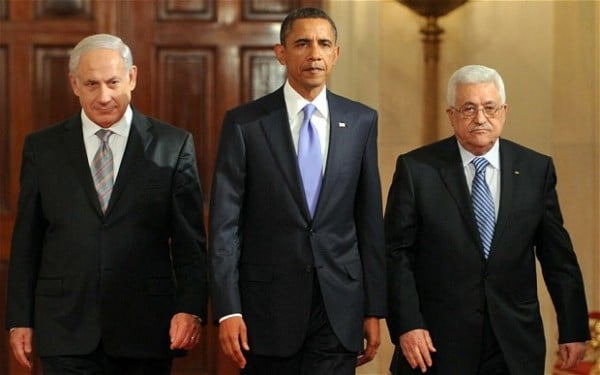
Israeli PM Benjamin Netanyahu, US President Barak Obama, and PA President Mahmoud Abbas.
1. A Bird Does Not Change Its Feathers.
The big players are not going anywhere. In 2014, Netanyahu will still be Prime Minister of Israel, Abbas will still head the Palestinian Authority, and Obama will still be the U.S. president. Obama has for some time now removed himself from the scene, with Secretary of State John Kerry stepping in as the leader of negotiations.
Kerry should realize that Abbas and Netanyahu are the veterans and have real stakes for agreeing to any kind of proposal. Abbas is still weak. With talks of Hamas-Fatah unity in the near future, he lacks the authority and power to make big decisions. In the press, Abbas has recently been under fire, being called a traitor for rejecting any boycott of Israel proper. In response, Abbas has been denying any involvement in secret talks with Israel and sent some mixed messages in a Christmas message he released on Monday.
Netanyahu also faces restrictions, bound to his government that currently consists of a right wing majority Parliament. For this reason, it should not come as surprise that Netanyahu is expected to approve the building of more settlements in the coming days, along with the promised release of the third round of Palestinian prisoners on Sunday. Settlements are considered to be an obstacle to moving forward in peace talks, and the announcement has already spurred threats from the European Union and the Palestinian Authority should the green light be given for additional construction.
2. History has a way of repeating itself.
This is not the first time that Washington has set the tone for peace talks. Much of the anticipation surrounding Kerry’s 9-month time frame for a final status agreement bears resemblance to the 1990s.
With recent bursts of violence at the Gaza border and West Bank and a failed bus bombing near Tel Aviv on Sunday, there is reason to believe that the escalation of violence will continue. In a recent New York times op-ed, Ali Jarbawi, the Minister of Planning and Administrative Development of the Palestinian Authority Government, warns that a third intifada may be on the horizon due to worsening of conditions under occupational rule and the cost of rising hopelessness. Keeping these dangers in mind, leaders should go about the negotiations with a sense of caution and prepare for the worst.
3. Be realistic.
It is admirable that the White House has shown a great sense of urgency and dedication to helping Israelis and Palestinians move forward. Despite Kerry’s call for quiet and public discretion regarding talks that are underway, sources have leaked that the U.S. has a plan that may be ready for release before the end of the year, with the goal of coming to an agreement by the end of January. Some details that are being circulated include Israeli withdrawals from the West Bank with drones deployed to the area for security reasons and giving Israel control of the Jordan border until Palestinian Authorities take over. Abbas called for the Arab League to be a part of the decision making process, where the idea of Israeli presence at the Jordan Valley border was rejected by them both. Also according to these sources, the U.S. has rented out 50 rooms in a Jerusalem hotel in efforts to force Netanyahu to accept the Israeli withdrawals proposal.
As much as the U.S. may push, it is not the U.S. that at the end of the day needs to live side by side in peace. Just as parents need to understand that their children will lead their own lives, get hurt, and make mistakes, so too will the Israelis and Palestinians in moving forward towards a new status quo. The Obama administration does make that distinction, claiming that its main goal is to get Palestinians and Israelis closer to reaching final status agreements. Whether you are an optimist or pessimist, there are definitely reasons to expect noteworthy developments in 2014, and it is up to the Obama administration to adhere to modest goal making as the New Year unfolds.